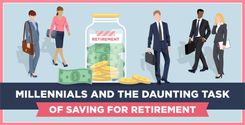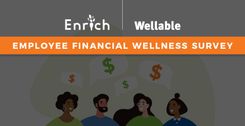Related Posts
Employers and Organizations
How Employers Use Financial Wellness to Help Gen X Employees
Last Update: June 4, 2019
The unhappiest and most financially stressed age group in the U.S. is Gen X, according to MetLife’s latest Employee Benefit Trends Study.1
This population of adults ages 38 to 53 is sandwiched right between the more high-profile millennial and baby boomer generations.
Although not given as much media attention, Gen X is 53 million strong and makes up a third of the U.S. workforce.2
The MetLife study reveals that 18 percent of Gen X employees say they don’t plan to ever retire—even though they feel far more unappreciated and unengaged at work than millennials and baby boomers.
This suggests that as many as one in five Gen X employees think they are too behind on retirement savings to catch up.
The State of Gen X Finances
How dire is the news about Gen X? Here are just a few statistics from several studies in the past two years:
- 41 percent of Gen X employees are not confident about their finances.1
- 47 percent of Gen X employees do not have a savings of at least three months’ salary.1
- 48 percent of these employees live paycheck to paycheck.1
- Gen Xers have more credit card debt than either millennials or baby boomers – an average of $9,000.3
- They have the most overall debt, with an average of $152,400.4
- Despite the debt, Gen Xers spend almost $3,500 each year eating out, drinking prepared beverages and buying lottery tickets.3
- 84 percent of Gen Xers made financial planning goals for 2019.5
- 68 percent of Gen X employees believe they can reach their long-term financial goals.6
Although the numbers don’t look good, there is plenty of opportunity for Gen X to turn it around.
What Gen Xers Could Do to Help Their Finances
Gen Xers have the ability to catch up and reach their financial goals because they are still in their prime earning years.
With several years before retirement, Gen X employees have time to increase their retirement savings.
While still working, Gen Xers should also attack their debt, paying off high-interest loans first. Although one solution is to consolidate debt into one loan, this can be risky.
Instead, Gen Xers should create and stick to a budget, reduce spending and/or downsize shelter and transportation.
The MetLife study also suggested that Gen Xers could be less stressed about money if they understood and participated in the financial benefits offered by their employers such as retirement plans, insurance plans and financial wellness programs.
Offering a financial wellness program, like Enrich, could help put Gen Xers on solid financial footing.
Reducing Employee Stress Helps Everyone
A recent study by Salary Finance7 shows that U.S. companies lose $500 billion each year in lost productivity due to employee financial stress.
Additionally, financially stressed employees are 2.2 times more likely to quit their job. Finally, these employees become less efficient, delay assignments and lack morale.
When employees are stressed about finances, employers pay a high price. According to Salary Finance, that price is an average of 11 to 14 percent of payroll expenses.
Stopping such a loss is a wise investment for companies. The return on investment for financial wellness is over $3 for every dollar invested in the program.8
Helping employees, especially financially burdened Gen X employees, work through financial issues affects a company’s bottom line.
Adding the Enrich Financial Wellness Program is the perfect tool to get Gen Xers on the right track and help them meet their future financial goals.
To see how the Enrich Platform leverages technology and gamification to improve Financial Wellness, check out our demo video here.
1 - https://www.pewresearch.org/fact-tank/2018/04/11/millennials-largest-generation-us-labor-force
2 - https://www.metlife.com/employee-benefit-trends/ebts-thriving-in-new-work-world-2019/
3 - https://www.bankrate.com/pdfs/pr/20190213-february-fsi.pdf
4 - https://www.newyorkfed.org/microeconomics/hhdc.html
5 - https://www.allianzlife.com/about/news-and-events/news-releases/Driven-by-Millennial-Optimism-Americans--Putting-Less--Focus-on-Finances
6 - https://www.fico.com/en/newsroom/fico-survey-only-1-in-3-gen-x-think-they-will-reach--long-term-financial-goals-07-13-2017
7 - https://www.salaryfinance.com/us/financial-wellness-guide-2019/
8 - https://hbr.org/2010/12/whats-the-hard-return-on-employee-wellness-programs
Featured Posts

Employers and Organizations
3 MIN
10 Simple Ways Benefits Managers Can Recession-Proof Their Employee Benefits Package

Employers and Organizations
3 MIN
3 Reasons to Make After-Tax Contributions to Your Retirement Plan

Employers and Organizations
4 MIN
Financial Information vs Employee Behavior Change: Which Is More Important for Your Company’s Financial Wellness Program?

Employers and Organizations
3 MIN
Does Your Employee Financial Wellness Program Take Mindset Into Consideration?
Related Posts

Enrich News
4 MIN
Millennials and the Daunting Task of Saving For Retirement

Employers and Organizations
4 MIN
2020 Employee Financial Wellness Report Finds Employees Nearing Retirement Age and Younger Millennials are Struggling Most

Financial Institutions
5 MIN
What Financial Institutions Must Do to Stop the Cycle of Life-Long Debt
